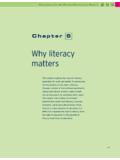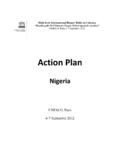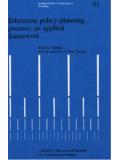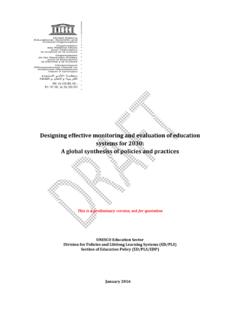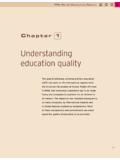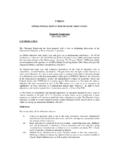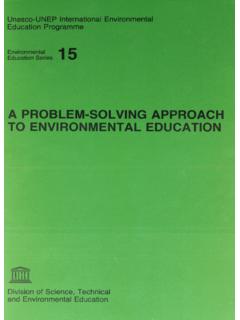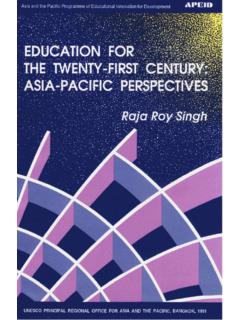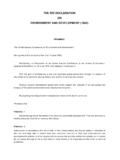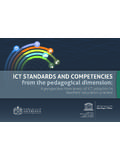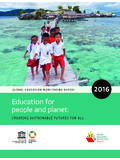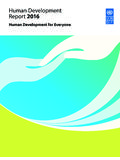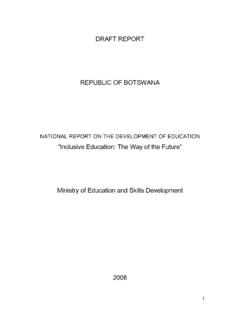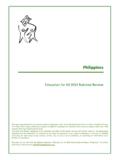Transcription of GENDER and ICTs Overview Report - UNESCO
1 GENDER and icts Overview Report Anita Gurumurthy Institute of Development Studies September 2004 ISBN 1 85864 840 8 ii Anita Gurumurthy (author) is a Research Consultant at the Indian Institute of Management, Bangalore. She is currently working on a national-level research study in India that seeks to map partnerships between the government and NGOs in public health. She has written on reproductive health and rights, information and communication technologies ( icts ), and globalisation from a Southern perspective. Anita is a member of Development Alternatives with Women for a New Era (DAWN) - a network of Southern feminists - and a founder member of IT for Change - a network in India that works on ICT for development issues. Susie Jolly (editor) is BRIDGE GENDER Communications Officer. She has worked on GENDER and poverty, sexual rights, HIV/AIDS, culture, and icts .
2 Wendy Harcourt (external advisor) is Editor of the journal Development and Director of Programmes at the Society for International Development, Rome, Italy. Wendy has written widely in the area of GENDER , culture and development, including edited books on women and the Internet, reproductive rights and health, and sustainable development. She is currently undertaking research for two books: Political Conflict, Women and Well-being in South Asia and Women and the Politics of Place . Credit is due to BRIDGE team members Ra ida Al-Zu bi, Lata Narayanaswamy and Hazel Reeves, and to Parminder Jeet Singh and Gurumurthy Kasinathan from IT for Change, for their substantive input into the Report , and to Judy Hartley for copy-editing. This Overview Report has been undertaken with the financial support of the Department for International Development, UK (DFID), Development Cooperation Ireland (DCI), the New Zealand Agency for International Development, the Swedish International Development Cooperation Agency (Sida) and the Swiss Agency for Development and Cooperation (SDC).
3 BRIDGE was set up in 1992 as a specialised GENDER and development research and information service within the Institute of Development Studies (IDS), UK. BRIDGE supports GENDER mainstreaming efforts of policy-makers and practitioners by bridging the gaps between theory, policy and practice with accessible and diverse GENDER information. Other publications in the Cutting Edge Pack series: GENDER and Citizenship, 2004 GENDER and Armed Conflict, 2003 GENDER and Budgets, 2003 GENDER and HIV/AIDS, 2002 GENDER and Cultural Change, 2002 GENDER and Participation, 2001 These packs, along with all other BRIDGE publications including In Brief, can be downloaded free from the BRIDGE website at Paper copies will be available for sale through the IDS virtual bookshop at , or from the IDS bookshop, Institute of Development Studies, University of Sussex, Brighton BN1 9RE, Email: , Telephone: 01273 678269, Fax: 01273 621202.
4 A limited number of copies will be available on request to organisations based in the South (contact BRIDGE for more details: iii Table of Contents Index of Index of Index of Executive 1. GENDER and icts : Old and The ICT GENDER in the icts 2. Inequities in the Information The Digital Gendered Dimensions of the Information Society: The 3. GENDER and icts : Mapping icts as Tools for Women s Right to icts as Tools to Challenge GENDER Inequality and Promote Women s 4. Engendering the ICT Arena Future Need for a GENDER -sensitive Policy Need for Advocacy towards GENDER -sensitive ICT GENDER concerns in Project Planning and Concluding iv Index of Boxes Box 1: Women s Pirate Radio Underside of Box 2: GENDER in the World Summit on the Information Society (WSIS)..14 Box 3: The Rural-Urban Box 4: Monopolies and Access for the Box 5: Pornography in Internet Caf Box 6: The Knowledge-based Box 7: GENDER Ideologies in Information and Communications Box 8: The Internet and the Sex Box 9: Examples of E-commerce Opportunities for Box 10: GENDER Differentials in Access to Distance Box 11: Telecentres: Some Box 12: GENDER -aware Guidelines for Policy-making and Regulatory Agencies Recommended by the ITU Task Force on GENDER Index of Tables Table 1: Women s Relationship with Table 2: Advocacy for GENDER Issues in New icts Some Critical Table 3: Key issues to Consider for GENDER -equal Outcomes in the ICT Index of Graphs Graph 1: Telephone subscribers per 100 Graph 2: Access to New Graph 3: Access to New Graph 4.)
5 Total Internet users and female Internet v ACRONYMS ALAI Agencia Latinoamerica de Informaci n APC Association for Progressive Communications APC WNSP Association for Progressive Communications Women s Networking Support Programme AUWMD Association of Uganda Women Medical Doctors AWORC Asian Women s Resource Exchange CBO Community-based organisation CEDAW Convention on the Elimination of All Forms of Discrimination Against Women CODESRIA Council for Development of Social Science Research in Africa DAWN Development Alternatives with Women for a New Era DFID Department for International Development, UK DISK Dairy Information System Kiosk ESCAP United Nations Economic and Social Commission for Asia and the Pacific FEMNET African Women s Development and Communication Network GKP Global Knowledge Partnership GSWG GENDER Strategies Working Group icts Information and communication technologies IDRC International Development Research Centre IDS Institute of Development Studies ILO International Labour Organisation INSTRAW United Nations International Research and Training Institute for the Advancement of Women IPR Intellectual Property Rights ITU International Telecommunication Union KRNIC Korean Network Information Center KTN Knitting Together Nations MDGs Millennium Development Goals MIC Ministry of Information and Communications (South Korea)
6 NGO Non-governmental organisation NGO GSWG NGO GENDER Strategies Working Group REPROSALUD Community Reproductive Health Project, Peru SDC Swiss Agency for Development and Cooperation SEWA Self Employed Women s Association Sida Swedish International Development Cooperation Agency SP Stability Pact SP GTF Stability Pact GENDER Task Force TNCs Transnational corporations UN United Nations UNDAW United Nations Division for the Advancement of Women UNDP United Nations Development Programme UNESCO United Nations Educational, Scientific and Cultural Organization UNCSTD UN Commission on Science and Technology for Development UNGASS United Nations General Assembly Special Session UNIFEM United Nations Development Fund for Women USAID United States Agency for International Development WENT Women s Electronic Network Training Workshop WIPO World Intellectual Property Organization WSIS World Summit on the Information Society WTO World Trade Organization vi GLOSSARY Analogue Transmitted bit-by-bit by electronic wave programme Broadband A type of data transmission in which a single medium (wire) can carry several channels at once.
7 Digital Transmitted all in one go by digits GPL General Public Licensing IP Internet Protocol IT Information technology Input/Output Input is whatever goes into a computer ( data and commands) while output is anything that comes out of computer ( text and pictures) PDA Personal Digital Assistant - a handheld device that combines computing, telephone/fax, Internet and networking features Proprietary software Privately owned and controlled software PrepCom Preparatory committee Telecentre Community based centres with ICT equipment Teledensity Telephone density VoIP Voice-over Internet Phone For more definitions, search 1 EXECUTIVE SUMMARY New technologies in the information and communications arena, especially the Internet, have been seen as ushering in a new age. There is a mainstream view that such technologies have only technical rather than social implications.
8 The dramatic positive changes brought in by these information and communication technologies ( icts ), however, have not touched all of humanity. Existing power relations in society determine the enjoyment of benefits from icts ; hence these technologies are not GENDER neutral. The important questions are: who benefits from icts ? Who is dictating the course of icts ? Is it possible to harness icts to serve larger goals of equality and justice? Central to these is the issue of GENDER and women s equal right to access, use and shape icts . Access to new icts is still a faraway reality for the vast majority of people. The countries of the South, particularly rural populations, have to a significant extent been left out of the information revolution, given the absence of basic infrastructure, high costs of ICT deployment, unfamiliarity with icts , dominance of the English language in Internet content and indeed lack of demonstrated benefit from icts to address ground-level development challenges.
9 These barriers pose even greater problems for women, who are more likely to: be illiterate; not know English; and lack opportunities for training in computer skills. Domestic responsibilities, cultural restrictions on mobility, lesser economic power as well as lack of relevance of content to their lives, further marginalise them from the information sector. The ICT arena is characterised by the strategic control exercised by powerful corporations and nations monopolies built upon the intellectual property regime, increasing surveillance of the Internet and an undermining of its democratic substance, and exploitation of the powerless by capitalist imperialism, sexism and racism. Within the ICT arena women have relatively little ownership of and influence on the decision-making processes, being underrepresented in the private sector and government bodies which control this arena.
10 icts have brought employment gains, including for women. However, patterns of GENDER segregation are being reproduced in the information economy where men hold the majority of high-skilled, high value-added jobs, whereas women are concentrated in the low-skilled, lower value-added jobs. Work in call centres perpetuates the devaluation of women s labour, and organisations in the information technology sector, as elsewhere, reward behaviour that is considered masculine. Some international organisations and civil society groups are engaging with issues that concern the democratisation of the ICT arena - from the digital divide and the right to communicate, to cultural diversity and intellectual property rights. GENDER equality advocates have also been pushing for addressing the GENDER dimensions of the information society: integrating GENDER perspectives in national ICT policies and strategies, providing content relevant to women, promoting women s economic participation in the information economy, and regulating violence against women and children connected to pornography on the Internet.
